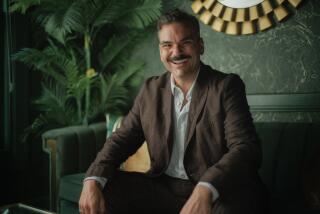Nebraskan Is Half the Man He Was a Year Ago
- Share via
VALENTINE, Neb. — He is still a mound of a man, but his blue eyes widen with delight as he presses his chest with his fingertips, smiles mischievously and makes the grand announcement: He can feel his ribs.
To Patrick Deuel, this small moment is huge. Headline huge.
Man Can Feel Ribs -- A First in 25 Years.
One year ago, Deuel weighed 1,072 pounds. He was so enormous that his bedroom wall had to be cut out to extract him from his Nebraska home. Then, he was rushed to a South Dakota hospital in an ambulance with extra-wide doors that had to be dispatched from Denver.
One man. More than half a ton. Mind-boggling.
So were the grim realities of Deuel’s life: He hadn’t left his bedroom in seven months. He’d barely been outside in seven years. He couldn’t sit up. He couldn’t roll over by himself. He had heart trouble and diabetes.
Patrick Deuel was dying. A photo taken last June shows a balloon-like figure sprawled helplessly on his stomach.
Now, 12 months after being hospitalized for gastric bypass surgery, Deuel sits on a love seat that is propped up on cement blocks. He still looks like a plus-size Buddha. But he is less than half the man he used to be. And that, his doctor says, is amazing progress.
Deuel concurs.
“I’m used to looking in the mirror and seeing the Michelin man,” he says. “All of a sudden ... I look a little more like a human being and I say, ‘Ooooh, my God, where did he come from?’ ”
Deuel is happy he can feel his ribs and see bones in his hands. But nothing is more thrilling than that number on the scale: 499 pounds.
He pumps an arm in triumph. He hasn’t been south of 500 in two decades.
Deuel now goes out almost every day, walks a bit and thinks about all the things he hopes to do someday.
“Life is infinitely better,” he says.
*
Patrick Deuel’s weight was off the charts before he even knew it. Before he could walk or talk, he says, medical records defined him as obese.
By the time the ambulance pulled into his driveway more than 40 years later in the tiny town of Valentine, Deuel had long been a prisoner of his many pounds. He couldn’t work, attend a football game or -- for a time -- even sit in his parents’ home.
And he wasn’t shy about talking about it.
When Deuel arrived at Avera McKennan Hospital in Sioux Falls, S.D., he welcomed the spotlight, determined to prove he was no Guinness Book footnote but a man with a message: Obese people suffer because the healthcare system and insurance companies don’t do enough to help them.
He also liked being an inspiration.
“If I can lose weight, anybody can do this -- and I mean anybody,” he says. “My willpower is basically zero.”
In the year since, Deuel’s story has brought him more than 2,000 e-mails and letters from as far as China and Saudi Arabia. He has acquired an agent and filmed a British documentary. And he has talked openly -- and often humorously -- about his obesity.
“My dad says I was supposed to be 8-foot-4,” he jokes, “but I quit growing.”
Deuel, 43, was a fast-food junkie hooked on pizza, chips, beef jerky and chili dogs. He also gobbled down cherry blintzes and ambrosia (a creamy fruit, marshmallow and coconut concoction).
Although those days are over, Deuel doesn’t believe in total deprivation.
He exercises with barbells and weights, but he still smokes (he’s down to a pack a day), saying he can’t kick two bad habits at once. And he refuses to consider any foods taboo.
“If you have a craving and don’t take care of it, it’s going to grow and grow and grow and it’s going to make you do something stupid -- binge,” he says.
About twice a month, Deuel indulges in foods most dieters would consider off-limits: a piece of chocolate, an ice cream bar, nachos.
“I’ve lost 102 pounds in 70 days, eating what I wanted,” he says. “Tell me it doesn’t work. ... For me, the easiest way to stay on my diet and not go absolutely crazy to is eat [to satisfy the craving], get that out of the way and get back on the program.”
Dr. Fred Harris, the Sioux Falls surgeon who operated on Deuel last fall, understands -- to a point.
“An occasional indiscretion is OK,” he says. “Every once in a while you have to have a piece of chocolate, providing you’re not carrying the bag around all the time.”
Harris speaks from personal experience. Three years ago, he had bariatric surgery and lost 100 pounds.
Practically speaking, Deuel simply cannot eat as he once did. Surgery initially reduced his stomach size from about 2 liters to the end of a thumb. Now, with the swelling long subsided, he can eat 4 to 8 ounces of food at once. Anything more and he’s likely to feel pain and vomit.
Deuel concentrates on high-protein, low-salt foods: cottage cheese, spinach, asparagus, shrimp, steak, roasts, cheese.
So far, so good.
Harris says bariatric surgery works if a patient loses more than 50% of excess body weight. “If Patrick wouldn’t lose another pound, I’d think he had been a success,” he says.
Look at it this way, the doctor adds: “He’s lost two NFL defensive linemen.”
When Deuel loses more weight, Harris plans to remove his panniculus, an apron-like layer of abdominal fat. That surgery could trim another 40 to 70 pounds.
It was Deuel’s hometown doctor who called Harris last year after she arranged for her patient to get emergency care for his neglected dental work, then realized he needed more help.
“It was clear we had a dying patient,” Harris says. “I told him, ‘We don’t have weeks. We have days or hours.’ ”
Even now, Deuel says he thinks he could have lost weight without surgery. He dropped more than 400 pounds, much of it water, before his surgery in October.
Harris says Deuel’s weight problems are not simply from overeating.
“I’m absolutely convinced the basic, overlying cause for morbid obesity is genetic,” Harris says. “There’s some nature, some nurture. But it’s like wanting to have blue eyes and having brown eyes. You can’t fight it.”
Dr. Samuel Klein, director of the Center for Human Nutrition at Washington University’s School of Medicine in St. Louis, says it’s likely there’s a genetic predisposition to obesity, but that has not been proved. About 40% of weight variability, he says, is related to genetics.
To hear Deuel tell it, his troubles began when he was 3 months old and was diagnosed as morbidly obese. (Some medical experts say such assessments can’t be made so young.)
His mother, Betty, says doctors offered little guidance, though one warned her young son: “If you don’t get some of this weight off, you’re not going to live to be very old.”
Neither parent was fat, but one of Deuel’s grandfathers weighed more than 300 pounds.
Deuel’s mother worked in a health-food store and says she prepared healthy meals -- lots of salads and squash -- but nothing seemed to work.
By high school, Deuel was 300 pounds. He found his niche in music, lending his tenor voice to choirs and his trombone-playing talents to bands. He attended a semester of college, then worked a variety of restaurant jobs.
He took advantage of free meals, he says, and “made a lot of rotten choices.”
Deuel tried all kinds of diets. He even lost 300 pounds on one, but he quit because he couldn’t afford the supplements.
In the mid-1980s, he fell and hurt his back and ended up on disability, making him even more sedentary.
But there was one positive turn in Deuel’s life. He met Edith Runyan, a divorced school guidance counselor, through a newspaper personals ad.
She found his personality appealing. “He had a positive attitude about life even though he had been kicked in the teeth a lot emotionally,” she says.
They married a decade ago, when Deuel weighed 750 pounds.
His weight gain continued, his waist expanding up to 90 inches. Vertically, that would be 7-foot-6, about the height of Yao Ming, the Houston Rockets star.
Now, Deuel can move gingerly with two walkers.
He hopes to become a motivational speaker. Though he first talked about slimming all the way down to 240 pounds, now he says maybe he’ll settle for weighing more -- it depends how he feels.
He already has plans: to go fishing, attend a football game and, yes, drive to McDonald’s for an Egg McMuffin.
“Just being able to go out and do what I want to do -- when I get to that point,” he says, “I’ve reached my goal.”
And his timetable?
“At least 15 minutes before I die,” he jokes.
He smiles and reconsiders.
“Maybe a half-hour.”
More to Read
Go beyond the scoreboard
Get the latest on L.A.'s teams in the daily Sports Report newsletter.
You may occasionally receive promotional content from the Los Angeles Times.










